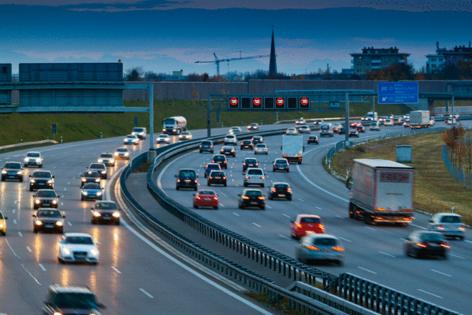Michigan considers studying usage-based tax for additional roads funding
Published in News & Features
Roads could be funded in a new way in Michigan under new pilot program proposed as part of the state budgeting process.
Democrats in the Legislature have allocated $5 million in the Michigan Department of Transportation's proposed budget for a "road usage charge study" that would evaluate what a "mileage-based revenue collection" might look like in comparison to the current system, which relies largely on taxes collected from fuel purchases.
The gas tax "is just not getting it done," Baruch Fiegenbaum, senior managing director of transportation policy for the Reason Foundation, said on the Michigan Department of Transportation's podcast.
"The gas tax is basically a rock star on his farewell tour," Fiegenbaum said. "It's been around for 100 years and it's been a great revenue source for 100 years, but because of the improvements in fuel efficiency of conventional vehicles and also the growing number of hybrid and electric vehicles, it's just not a fair way to fund roadways going forward."
Michigan roads are quickly approaching a revenue cliff as the state this year begins to spend the last $700 million tranche of $3.5 billion the Whitmer administration borrowed in 2019 to pay for highway reconstruction projects after lawmakers rejected tax hikes.
When the $3.5 billion runs out next year, the state will be saddled not only with paying off the loans and interest of that program but also facing an estimated annual revenue shortfall of up to $3.9 billion to continue paying for needed road work across Michigan.
There is no additional revenue available so the state is saddled with finding new funding sources, said Rep. Ranjeev Puri, a Canton Democrat who leads the House’s transportation budget.
“If we continue to bury our heads in the sand as we have for decades as a state, that number is only going to grow,” Puri said. “We really need to get intentional about how we’re going to find this money.”
Potential ways to implement a usage-based fee could include a GPS-based system, which Fiegenbaum said has been enacted in other states. In some places, that does include data collection on when and where a person drives, which he said offers decision-makers an advantage in better understanding how congestion and where future highways might be beneficial. But no state has done that as an exclusive option, he added.
Other options include GPS options that do not track the specifics of where or when a person drives, but simply how much, he said, or an odometer reading done by a mechanic a few times a year.
If the funding for the pilot program makes it through the budgetary process, the Department of Transportation would have to begin the study by the end of the year, according to the Senate proposal, with an intended completion before Dec. 31, 2026. Participation in the study would be voluntary.
Beyond that, specific of a broader implementation is unclear.
"Much like the tolling study, the (road usage charge) study is being driven by the Legislature," Jeff Cranson, MDOT director of communications, said in an email. "It is too soon to say what form it would take but MDOT officials are working collaboratively with lawmakers on workable language for their request."
_____
©2024 The Detroit News. Visit detroitnews.com. Distributed by Tribune Content Agency, LLC.







Comments